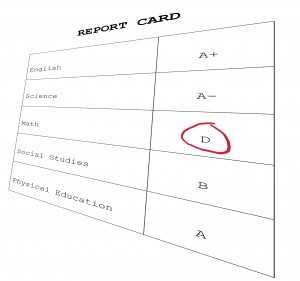How to Help Your Child by Withholding Praise
I have two teenagers whom I love more than life. I’m really blessed because they are truly great kids. I’d like to think that we have done a good job parenting them and helping them become the good people they are, and some of that parenting involves praising them and providing positive reinforcement. So when I read some recent articles that claim that American parents are praising our kids too much, that certainly got my attention.
PRAISE EFFORT, NOT TALENT
 Here’s the bottom line: it’s not that we shouldn’t be praising our kids, but rather that we should be praising their efforts rather than their innate talents. Say, “You worked so hard, I’m proud of you,” instead of “You’re so smart.” I frequently give the former praise, but I have been guilty of dispensing the latter as well. The theory behind this line of thinking, as discussed in the book NurtureShock by Po Bronson and Ashley Merryman, is that labeling your child as smart instead of hard-working may actually cause the child to slack off and not apply herself. She assumes her “gift” will just take care of the rest. A study of 400 fifth-graders by Stamford psychologist Carol Dweck confirmed this. Dweck also suggested that when we praise children for being smart, we teach them to look smart and not risk making mistakes. When “smart” kids fail, they assume it proves they may not truly be smart. Whereas children praised for their efforts are more willing to challenge themselves, and if they fail, they simply assume they need to work harder next time. The failure does not become internalized.
Here’s the bottom line: it’s not that we shouldn’t be praising our kids, but rather that we should be praising their efforts rather than their innate talents. Say, “You worked so hard, I’m proud of you,” instead of “You’re so smart.” I frequently give the former praise, but I have been guilty of dispensing the latter as well. The theory behind this line of thinking, as discussed in the book NurtureShock by Po Bronson and Ashley Merryman, is that labeling your child as smart instead of hard-working may actually cause the child to slack off and not apply herself. She assumes her “gift” will just take care of the rest. A study of 400 fifth-graders by Stamford psychologist Carol Dweck confirmed this. Dweck also suggested that when we praise children for being smart, we teach them to look smart and not risk making mistakes. When “smart” kids fail, they assume it proves they may not truly be smart. Whereas children praised for their efforts are more willing to challenge themselves, and if they fail, they simply assume they need to work harder next time. The failure does not become internalized.
ASIAN PARENTS’ SECRET?
In an article by Dr. Soo Kim Abboud and Jane Kim, they propose that Asian students perform better academically than their non-Asian counterparts not because Asian kids are smarter but because of how they are raised. First, Asian children are encouraged to work hard and focus on school work more than on other extracurricular activities. Second, they are praised for their positive efforts. The article suggests that American parents tend to praise mediocre efforts for fear that negative comments will harm their children’s self-esteem; however, they should only be lauding performances that are truly praiseworthy. If a child does poorly on a test but tried hard, it is okay for a parent to praise the hard work but express disappointment in the results, then they should discuss what the student can do to improve performance moving forward. Similarly, when a child works hard and does well, both effort and achievement should be praised.
I am an American-born Asian parent (as my parents and grandparents were before me). Love of learning and working hard toward a good education have always been an important part of my family culture. Yes, I was the nerd with the 4.0 average, but while I always knew my parents wanted me to achieve, I loved (and still love) learning just for the sake of gaining knowledge about something new. I have my parents to thank for that. Mom and Dad employed the praise practices discussed by Abboud and Kim, as I do now for my children. On the occasions when my kids bring home an assignment or test with a low grade, the first thing we do is neutrally (as best I can) discuss where mistakes were made, correct them (because material often resurfaces on mid-terms and finals), then talk about strategies to do better next time. As long as they made a good effort, that it what matters most.
Not every kid earns or deserves a trophy. Kids are going to lose some games. Not everyone can get a part in the school play. Kids won’t always get an A or even a B on tests. And it’s all okay. My bottom line? Moderation. Sure, I sometimes tell my children they are smart or they are beautiful. But most of all, no matter what kind of praise I give them, I make sure they know they are loved. And remember, grades are temporary, but love of learning is forever.